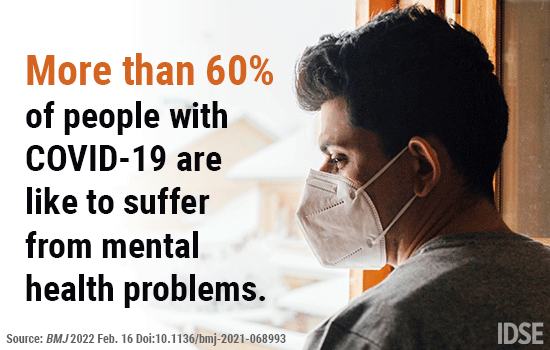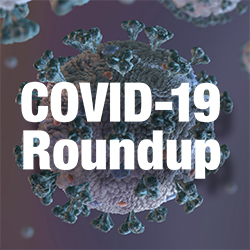By Marie Rosenthal, MS, and Ethan Covey
Stop taking high doses of vitamins to prevent COVID-19, researchers from Canada warned; they probably aren’t working unless you are malnourished. Scientists found rogue antibodies that might be behind clotting issues in people with COVID-19. Researchers are starting to think that omicron wasn’t so much less virulent in and of itself, but that increased vaccination created a general lessening of virulence. Pfizer-BioNTech released real-world data about its vaccination in adolescents. And finally, many, many people who survived COVID-19—even those with mild disease—are experiencing mental health issues. Recognizing and helping these sufferers is urgent, researchers said, because they fear an outbreak of suicide adding to the death toll from COVID-19.
‘Immune-Boosting’ Vitamins Not the Answer for COVID-19
Immune-boosting supplements, such as vitamin C, vitamin D and zinc, do not lessen one’s chances of dying from COVID-19, according to a review of COVID-19 hospitalization data by researchers at The University of Toledo (Clinical Nutrition ESPEN 2022 Jan 12. doi:10.1016/j.clnesp.2021.12.033).

“A lot of people have this misconception that if you load up on zinc, vitamin D or vitamin C, it can help the clinical outcome of COVID-19,” said Azizullah Beran, MD, an internal medicine resident at The University of Toledo College of Medicine and Life Sciences, in Ohio. “That hasn’t been shown to be true.”
Dr. Beran and his colleagues reviewed 26 peer-reviewed studies that included more than 5,600 hospitalized COVID-19 patients. Their analysis found no reduction in mortality for those being treated with vitamin D, vitamin C or zinc compared with patients who did not receive one of those three supplements.
Their analysis found that treatment with vitamin D may be associated with lower rates of intubation and shorter hospital stays, but the researchers said more rigorous study is needed to validate that finding.
Vitamin C and zinc were not associated with shorter hospital stays or lowering the chance of placing a patient on a ventilator.
While the study predominantly looked at patients who were already sick and hospitalized with COVID-19 when given the supplements, researchers analyzed a smaller subset of individuals who had been taking vitamin D before contracting the virus. They did not find a significant difference in the mortality rate of that population as well.
Researchers cautioned that the study shouldn’t be interpreted as saying vitamin and mineral supplements are bad or should be avoided, but rather make it clear that they are not effective at preventing COVID-19 deaths.
Some COVID-19 patients who are malnourished or otherwise deficient in micronutrients may benefit from taking supplements, but that’s because their bodies already lack essential nutrients—not because vitamin D or C is effective against the virus, they explained.
Rogue Antibodies Make Cells ‘Sticky’ to Trigger Blood Clots in COVID-19 Patients
Scientists have discovered that “rogue” antibodies circulating in the blood of COVID-19 patients can cause cells to lose their resistance to clotting.
Researchers at Michigan Medicine and the National Heart, Lung, and Blood Institute studied the blood samples of nearly 250 patients hospitalized for COVID-19 and found higher-than-expected levels of antiphospholipid autoantibodies, which can trigger blood clots in the arteries and veins of patients with autoimmune disorders, including lupus and antiphospholipid syndrome.

Specifically, they compared the blood samples of COVID-19 patients with those from healthy controls and found the COVID-19 samples contained higher levels of immunoglobulin G (IgG), which is also associated with COVID-19 disease severity. The researchers observed similar patterns, but to a lesser extent, after analyzing blood samples from 100 patients hospitalized for sepsis.
IgG helps bridge a gap between innate and adaptive immune responses. In normal cases, these features help protect the body from illness and infection. However, in some cases, this response can become hyperextended or altered and exacerbate illness.
When researchers removed IgG from the COVID-19 blood samples, they saw molecular indicators of “blood vessel stickiness” fall. When they added these same IgG antibodies to the control samples, they saw a blood vessel inflammatory response that can lead to clotting. Circulating factors that lead to the “stickiness” of healthy blood vessels during COVID-19 may help explain why the virus can affect many organs, including the heart, lungs and brain.
In a 2020 study, the research group found that autoantibodies from patients with active COVID-19 infections caused “a striking amount of clotting” in mice. In the new study, they uncover the possible reason: The autoantibodies appear to stress the endothelial cells that make up the inner lining of blood vessels and, in doing so, cause the cells to lose their ability to prevent blood clots from forming (Arthritis Rheumatol 2022 Feb 17. doi:10.1002/art.42094).
“This provides an even stronger connection between autoantibody formation and clotting in COVID-19,” said Hui Shi, MD, PhD, the lead author of the paper and a rheumatology research fellow at Michigan Medicine, in Ann Arbor. “When endothelial cells are activated, they cause healthy blood vessels to become ‘sticky,’ attracting other cells to the vessel walls and becoming more prone to thrombosis.”
While the link is strong, future studies must be done to find out whether these autoantibodies are the precise cause of thrombosis that contributes to clotting and increased severity of COVID-19, according to Jason Knight, MD, PhD, a co-author of the study and an associate professor of rheumatology at Michigan Medicine.
“We must do more research to decide if it is beneficial to screen patients with severe COVID-19 for these autoantibodies to evaluate their risk of clotting and progressive respiratory failure,” Dr. Knight said. “Eventually, we may be able to repurpose treatments used in traditional cases of antiphospholipid syndrome for COVID-19. This is a further step towards a full understanding of the interplay between coronavirus infection, the human immune system and vascular health.”
Omicron Less Severe? Vaccinations May Be the Reason
The reason that many people infected with the omicron variant have experienced less severe COVID-19 symptoms may be caused more by increased levels of vaccination than a general lessening of virulence found with the variant (MMWR Morb Mortal Wkly Rep 2022;71[6]:217-223).
“When you compare severity of illness during omicron to delta periods, we found significantly less need for ICU, use of mechanical ventilation and death during omicron versus delta,” said Peter Chen, MD, a professor of medicine and biomedical sciences at Cedars-Sinai Medical Center, in Los Angeles. “However, these differences were largely lost when we analyzed by vaccine status and indicated the chance of unvaccinated patients having critical illness and death was just as high with the omicron variant compared with the delta variant.”
The study, which was conducted with Michael Melgar, MD, a medical officer at the CDC, focused on electronic health records from patients 18 years of age and older who tested positive for SARS-CoV-2 and were admitted to one academic hospital in Los Angeles from July 15 to Sept. 23, 2021 (period of delta predominance; n=339), or from Dec. 21, 2021, through Jan. 27, 2022 (period of omicron predominance; n=737).
The epidemiologists found that fewer of the patients during the omicron surge required ICU admission and invasive mechanical ventilation, and fewer died while hospitalized. However, there were no significant differences in ICU admission or ventilation requirements when stratified by vaccination status.
A higher proportion of patients during the omicron surge were fully vaccinated (39.6% vs. 25.1%), and vaccination was associated with a decreased likelihood of ICU admission, and lower likelihood of death while hospitalized among older patients. This trend was amplified among patients who had received booster doses.
“As such, these data suggest that the perceived less severity of omicron is largely driven by a larger proportion of vaccinated people during the omicron period compared with the delta period and not necessarily due to less virulence,” Dr. Chen noted.
One of the main things that they wanted to understand was the percentage of people who were hospitalized “for COVID” versus “with COVID.”
“Our analysis used a very conservative approach to this question, and found that about 20% of the patients were hospitalized ‘with’ COVID-19 and not ‘for’ any particular symptoms of the disease.”
Dr. Chen noted that the reason for these admissions may simply be due to the large number of omicron infections in the general population—patients admitted for non–COVID-19 medical issues who were incidentally discovered to have COVID-19.
However, another possibility is that the dynamics of COVID-19 may have changed due to more widespread vaccinations and prior infections. “The SARS-CoV-2 omicron variant may not have caused the variety of symptoms we associate with COVID-19, but instead the infection led to a worsening of the patient’s other medical issues,” Dr. Chen said.
“Understanding if these reasons or others led to people being admitted with COVID-19—rather than for COVID-19—could be really enlightening as we proceed into the future with this virus.”
Overall, Dr. Chen added, the core message of the study is get vaccinated. Although breakthrough infections occurred, they reduced the severity of illness.
Pfizer-BioNTech COVID-19 Vaccine Highly Effective in Adolescents
A study of real-world data has shown that the Pfizer-BioNTech COVID-19 vaccine is highly effective at preventing SARS-CoV-2 infection in adolescents who are 12 to 17 years of age.
The findings are similar to those reported in clinical trials (MMWR Morb Mortal Wkly Rep 2021;70[5152]:1761-1765).
The study consisted of a prospective cohort of 243 adolescents in Arizona, 12 to 17 years of age, who received weekly polymerase chain reaction tests for SARS-CoV-2, from July 25 through Dec. 4, 2021. Most (190) of the participants contributed fully vaccinated person-time, defined as at least 14 days after receiving two doses of the Pfizer-BioNTech vaccine; 30 contributed partially vaccinated person-time (receipt of one dose or two doses but with the second dose completed less than four days earlier), and 66 contributed unvaccinated person-time.
Among the fully vaccinated group, the estimated effectiveness of the vaccine at preventing SARS-CoV-2 infection was 92%. Clinical trials assessing efficacy in this age group reported vaccine efficacy of 100% (N Engl J Med 2021;385[3]:239-250; N Engl J Med 2021;385[24]:2241-2251).
“For us to get similar numbers as those clinical trials is exciting,” said lead author Karen Lutrick, PhD, an assistant professor in the Department of Family and Community Medicine at the University of Arizona College of Medicine - Tucson. “We want vaccination to work as well in real-world situations as it does in clinical trials.”
COVID-19 Survivors Are 60% More Likely to Suffer Mental Health Problems
Patients who had COVID-19 have a significantly higher chance of experiencing mental health problems than their peers without COVID-19 (BMJ 2022 Feb 16. doi:10.1136/bmj 2021 068993).

In a large, comprehensive study of mental health outcomes in people with SARS-CoV-2 infections, researchers at Washington University School of Medicine in St. Louis and the VA St. Louis Healthcare System found that such disorders arose within a year after recovery from the virus in people who had serious and mild infections.
People who had COVID-19 were 60% more likely to suffer from mental health problems, such as anxiety, depression and suicide ideation; drug and alcohol use disorders; and disturbances in sleep and cognition, than those who were not infected.
The researchers analyzed de-identified medical records from the Department of Veterans Affairs, creating a controlled data set that included health information about 153,848 adults who had tested positive for COVID-19 sometime from March 1, 2020, through Jan. 15, 2021, and who had survived the first 30 days of the disease. Few people in the study were vaccinated prior to developing COVID-19, as vaccines were not yet widely available at the time of enrollment.
Statistical modeling was used to compare mental health outcomes in the COVID-19 data set with two other groups of people not infected with the virus: a control group of more than 5.6 million patients who did not have COVID-19 during the same time frame, and a control group of more than 5.8 million people who were patients from March 2018 through January 2019, well before the pandemic began.
Most study participants were older white men. However, the study included more than 1.3 million women, more than 2.1 million Blacks and large numbers of people of various ages.
Compared with those without COVID-19, people who contracted SARS-CoV-2 were 35% more likely to suffer from anxiety disorders, and nearly 40% more likely to experience depression or stress-related disorders. This coincided with a 55% increase in the use of antidepressants and a 65% growth in the use of benzodiazepines to treat anxiety.
Similarly, people who had recovered from COVID-19 were 41% more likely to have sleep disorders and 80% more likely to experience neurocognitive decline.
More worrisome, compared with people without COVID-19, infected people were 34% more likely to develop opioid use disorders and 20% more likely to develop nonopioid substance use disorders involving alcohol or illegal drugs. They were also 46% more likely to have suicidal thoughts.
Senior author Ziyad Al-Aly, MD, a clinical epidemiologist at Washington University, said it was imperative to recognize this suffering and treat it before “we start losing more people to suicide.”
More than 403 million people globally and 77 million in the United States have been infected with the virus since the pandemic started.
“To put this in perspective, COVID-19 infections likely have contributed to more than 14.8 million new cases of mental health disorders worldwide and 2.8 million in the U.S.,” Dr. Al-Aly said.
“There needs to be greater recognition of these issues by governments, public and private health insurance providers, and health systems to ensure that we offer people equitable access to resources for diagnosis and treatment,” he added.
To better understand whether the increased risk for mental health disorders is specific to the SARS-CoV-2 virus, the researchers also compared the COVID-19 patients with 72,207 flu patients, including 11,924 who were hospitalized, from October 2017 through February 2020. Again, the risk was significantly higher—27% and 45%—in those with mild and serious COVID-19 infections, respectively.
Because hospital stays can precipitate anxiety, depression and other mental conditions, the researchers compared people who were hospitalized for COVID-19 during the first 30 days of the infection with those hospitalized for any other cause. Mental health disorders were 86% more likely in people hospitalized for COVID-19.
“Our findings suggest a specific link between SARS-CoV-2 and mental health disorders,” Dr. Al-Aly continued. “We’re not certain why this is, but one of the leading hypotheses is that the virus can enter the brain and disturb cellular and neuron pathways, leading to mental health disorders.


